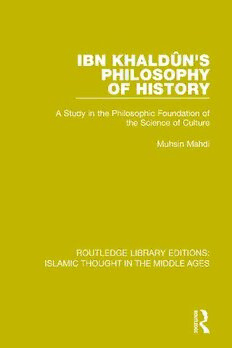
Ibn Khaldun's Philosophy of History: A Study in the Philosophic Foundation of the Science of Culture PDF
Preview Ibn Khaldun's Philosophy of History: A Study in the Philosophic Foundation of the Science of Culture
ROUTLEDGE LIBRARY EDITIONS: ISLAMIC THOUGHT IN THE MIDDLE AGES Volume 2 ’ IBN KHALDÛN S PHILOSOPHY OF HISTORY This page intentionally left blank IBN KHALDÛN’S PHILOSOPHY OF HISTORY A Study in the Philosophic Foundation of the Science of Culture MUHSIN MAHDI Firstpublishedin1957byGeorgeAllen&UnwinLtd Thiseditionfirstpublishedin2016 byRoutledge 2ParkSquare,MiltonPark,Abingdon,OxonOX144RN andbyRoutledge 711ThirdAvenue,NewYork,NY10017 RoutledgeisanimprintoftheTaylor&FrancisGroup,aninformabusiness ©1957MuhsinMahdi Allrightsreserved.Nopartofthisbookmaybereprintedorreproducedorutilised inanyformorbyanyelectronic,mechanical,orothermeans,nowknownor hereafterinvented,includingphotocopyingandrecording,orinanyinformation storageorretrievalsystem,withoutpermissioninwritingfromthepublishers. Trademarknotice:Productorcorporatenamesmaybetrademarksorregistered trademarks,andareusedonlyforidentificationandexplanationwithoutintentto infringe. BritishLibraryCataloguinginPublicationData AcataloguerecordforthisbookisavailablefromtheBritishLibrary ISBN:978-1-138-93913-4(Set) ISBN:978-1-315-66645-7(Set)(ebk) ISBN:978-1-138-94723-8(Volume2)(hbk) ISBN:978-1-138-94724-5(Volume2)(pbk) ISBN:978-1-315-67018-8(Volume2)(ebk) Publisher’sNote Thepublisherhasgonetogreatlengthstoensurethequalityofthisreprintbut pointsoutthatsomeimperfectionsintheoriginalcopiesmaybeapparent. Disclaimer Thepublisherhasmadeeveryefforttotracecopyrightholdersandwouldwelcome correspondencefromthosetheyhavebeenunabletotrace. Ibn Khaldün's Philosophy oE History A STUDY IN THE PHILOSOPHIC FOUNDATION OF THE SCIENCE OF CULTURE BY MUHSIN MAHDI George Allen and Unwin Ltd RUSKIN HOUSE MUSEUM STREET LONDON First published in 1957 This book is copyright under the Berne Convention. Apart from any fair dealing for the purposes of private study, research, criticism or review, as per mitted under the Copyright Act 1911, no portion may be reproduced by any process without written permission. Enquiry should be made to the publisher. Printed in Great Britain in lI-pt Imprint by Purnell fs! Sons Ltd. (Paulton) Somerset fs! London FOR MARY LOUISE Nauta rudis pelagi ut saevis ereptus ab undis in portum veniens pectora laeta tenet . .• This page intentionally left blank PREFACE It is a curious fate that history should for a long time have been considered and treated as the most humble form of knowledge, while philosophy was considered as the highest, and that now it not only ia superior to philosophy hut annihilates it. BENEDETTO CROCE1 I. In no other field has the revolt of modern Western thought against traditional philosophy been so far-reaching in its conse quences as in the field of history. The case between the ancients and their modern critics in its extreme form can be formulated as follows: For the ancients, 'historical knowledge is impos sible ';2 while for their modern critics all knowledge is historical. For the ancients, history means the description and explanation of actual events which are useful both as examples for men of action, and as material for the practical and theoretical sciences. Since the end of philosophy or science is the demonstration of necessary and explanatory conclusions which claim universal validity, history is, at best, the most humble of sciences because its conclusions are necessarily relative to particular events. For their modern critics, philosophy par excellence is the philosophy of history or the 'complete philosophy conceived from an historical point of view'. 3 The modern critics of traditional philosophy assert, not only that all facts are historical, but also that all reality is historical. Thus the issue between the ancients and the modems seems to raise the deeper issue of the nature of scientific knowledge and of Being. The ancients assert that behind the facts of history and experience there are universal and objective essences, natures, and causes, to which the concepts and judgments of the mind should correspond. These essences, natures, and causes are intrinsically and logically prior to the mutable facts of history and experience despite the fact that, in the order in which they are known, they are posterior to these: for they are the principles that underlie them and give them their intelligibility. The 1 History as the Story of Liberty, trans. Sylvia Sprigge (George Allen & Unwin 1941) 35· 2 R. G. Collingwood The Idea of History (Oxford 1946) 6. 3 Ibid. 7. 7
